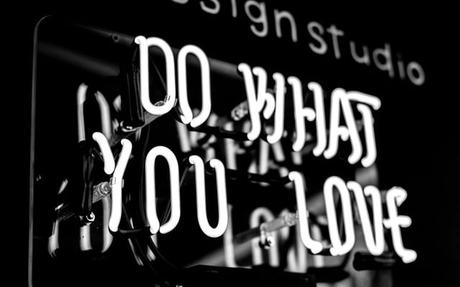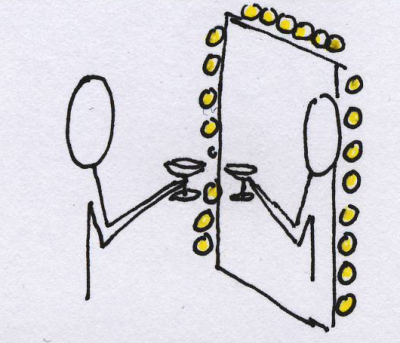
Consider all the words that pass through your aware mind during a day. This includes your inner dialogue, outer dialogue, and everything you post or read electronically.
Now, among all those words, identify the one word that causes you the most stress. Really think about it for a few seconds.
Now consider the word "should." Most people, whether they realize it or not, have a nuanced relationship with this funny little word. Yet it's never positive. It sounds like this:
- I should make more time to read
- I should be getting more sleep
- I shouldn't spend so much time on social media
- I should be farther along in my business
- I should be more mindful of my diet
- I should be better at parenting
How does the word make you feel?
Heavy, burdened, obligated, stressed?
We all have an ideal in our head of how things should be. We've become convinced that our successes are due, in large part, to all the should-ing we've done to ourselves. We fear that if we don't keep up with our shoulds then things will fall through the cracks and we'll fail miserably.

In using "should," you assume you're focused on the things you desire. But the truth is, you're faced the other way, pushing against the stuff you don't want. "Should" represents resistance, plain and simple. It feels heavy because you're trying to avoid negative consequences. You're not actually reaching for success.
For example, you want to be healthier, right? You say you should be working out more, should be eating less, should be getting more sleep. The heaviness of "should" indicates that you're focused on avoiding what you don't want, not on the joys of energy, flexibility, and strength. You'd like to think you're all fired up to move your body, eat healthy foods, and honor your body's rejuvenation time. But no. By using should you become more aware of thoughts like: "Ugh, I feel fat and unhealthy." You think that you can motivate yourself into action by pushing away all the stuff you're trying to avoid.
Should = Resistance
In an active state of resistance, you eat up your own creative capacity. Resistance steals away access to new, life-generating ideas, actions, and connections. "Should" keeps you from your own inner resources designed to bring the brilliant solutions you really want. Can anything positive come out of this? Maybe. But the effort won't be worth the return.
"Should" leads to dread, taxing effort, discomfort, exhaustion, guilt, and shame. Driven by should, you could force yourself to the gym and restrict yourself from the things you love to eat. You could make some progress on your health journey, but with all that resistance is it worth it? And more importantly, is it sustainable?
You might be thinking. "If I don't operate from 'should' then I'll probably lose my job, I'll lose my friends, I won't reach my goals. I'll never get anything done." Not true.
You have good intentions - like wanting to pay bills on time, keep a good credit score, feel good, and have a pleasant life. Having set those intentions then it would follow that inspired thoughts are in alignment with these intentions. Inspired thoughts are uplifting and expansive and they emerge when you're focused on what you want, not what you're trying to avoid.
To create more joy and fulfillment in your life, drop that heavy little word and pivot toward what you want. It's in the want that you unlock all those resources jammed up from resistance from should and allow for inspiration. When you take inspired action stemming from true desire you have access to new ideas and energy. You have the motivation to do all the actions that were continually pushed down your to-do list.

Use these four steps to free yourself from the "should" mindset:
Examine your feelings.
Every so often throughout your day drop into how you're feeling. If you're feeling great, then keep going!
Identify the underlying "should."
If you're feeling any negative emotion - confusion, frustration, boredom, apathy, anger, fear - it's a sign that a "should" is in play. Identify what you're resisting ("I should know what to do here." "I shouldn't be annoyed with my co-worker." "I should have prepped more.").
Change your focus.
Stop focusing on what you don't want and identify what you do want - what you honestly want. Trust the inspiration that emerges from answering one of these statements: "I want to..." "I can't wait to..." "I'm really excited by..." "It gives me great relief to..." "I feel joy when I..."
Follow where inspiration leads.
Follow the roadmap that your inspiration provides. It will lead you to a life that you live on purpose.
You have good, noble intentions, so trust that your inspired thoughts will spring you into action. They will feel light, not heavy. Remove the word "should" from your vocabulary, focus on what you want, and transform chronic stress into genuine fulfillment.
This guest post was authored by Amy Eliza Wong

Amy Eliza Wong is a certified executive coach who has devoted more than 20 years to the study and practice of helping others live and lead on purpose. She works with some of the biggest names in tech and teaches transformational leadership and communication strategies to executives and teams around the world. Her new book is Living on Purpose: Five Deliberate Choices to Realize Fulfillment and Joy (BrainTrust Ink, May 24, 2022). Learn more at alwaysonpurpose.com.

Ms. Career Girl was started in 2008 to help ambitious young professional women figure out who they are, what they want and how to get it.

